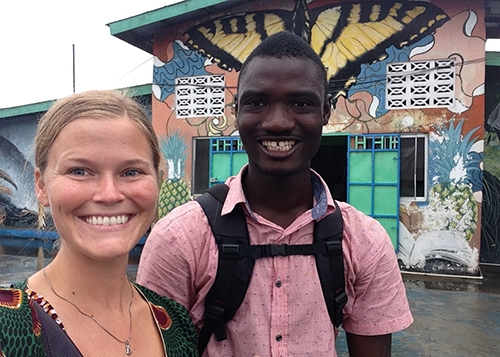MAJOR: Political Science
CURRENT POSITION: Director of campus operations and community engagement at UGHE, Partners in Health
First Cambodia. Then Namibia, Austria and Lesvos, Greece. Lastly Liberia.
Katie Letheren ’10 has spent the past five years as an international aid worker, primarily specializing in global health and crisis response.
Her time abroad, particularly in Liberia, motivated her to co-found the nonprofit Educate West Point. Working to strengthen the country’s post-Ebola health systems with Partners in Health, Letheren lived in Liberia for 1.5 years (ending Sept. 2017).
While there, she met Musa Sheriff, who inspired EWP and co-founded the organization with her and fellow aid worker, Mitch Mercer. Sheriff grew up in West Point, Liberia’s largest slum. He’s always dreamed of changing the fates of West Point children, like his own young son, with the power of education.
“Walking around West Point, the whole slum was flooded. There was a foot of water in peoples’ houses—one-room houses sleeping 10 people,” said Letheren, who majored in political science. “The slum was built on trash as far as you could see going out into the water.”
“There was no sanitation. Child prostitution and drug trafficking run rampant,” she added. “Once you see what this means for the residents— see it with your own eyes, you can’t turn away. You can’t carry on like you never saw it.”
So Mercer and Letheren readily agreed to help Sheriff start EWP. Launched in July 2017, EWP is partnering with the Liberian Ministry of Education to help the 22,000 children of West Point who can’t afford to attend school.
Government school in Liberia is technically free, Letheren said, but children still need uniforms, school supplies and food. Their parents, many who make a dollar a day, often can’t spare the money.
And the single government school in West Point couldn’t serve them all anyway.
“Once the Ebola treatment unit for the entire slum, the school is operating well over maximum capacity with 1,200 students,” Letheren said. “There is no electricity or running water, not enough chairs or desks, and many students cannot afford to eat a single meal during the school day. Just one meal of rice and hot soup costs 50 cents.”
And so EWP is striving to find sponsors for children. Sponsors who will help purchase essential supplies and help secure the education the children need to achieve their dreams. Like George Weah did. Sworn in as Liberia’s president in February, he grew up in another slum near West Point called Clara Town. Education helped him win the presidency, Letheren wrote in a recent article for Front Page Africa.
Letheren, now in Boston on a short-term contract with Partners in Health, was named PIH Liberia’s Employee of the Year in 2016. She’ll be stateside, assisting with the fall opening of PIH’s new University of Global Health Equity in Rwanda, until her first assignment with Doctors Without Borders is finalized.
She sums up her dedication to international aid work with a quote from the book she’s reading now, Chasing Misery, by Kelsey Hoppe.
“It is about saying, ‘you are human, as I am human, and if you must suffer abject and miserable circumstances the least I can do is be there with you … and let you know that you are not alone, that your suffering … is not forgotten. It is seen and it matters. You matter.’”
Letheren is writing her own book (out in 2020) about the mental and emotional toll of working as an international aid worker, and how Buddhist teachings can be applied to guide aid workers through these challenging times

